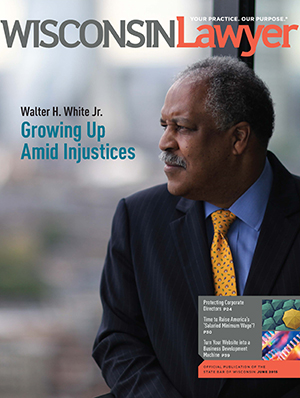 June 8, 2015 – Walter H. White Jr. is a successful international business lawyer based in London. But his life experiences in Wisconsin guide his continued efforts to increase diversity in the legal profession, promote human rights, and fight for social justice.
June 8, 2015 – Walter H. White Jr. is a successful international business lawyer based in London. But his life experiences in Wisconsin guide his continued efforts to increase diversity in the legal profession, promote human rights, and fight for social justice.
In her cover story for the June Wisconsin Lawyer, “Walter H. White Jr.: Growing Up Amid Injustices,” writer Dianne Molvig details White’s early encounters with racism and injustice in Wisconsin and how they shaped his professional life.
“I did not grow up respecting the ‘rule of law,’” said White at the ABA’s mid-year meeting in Houston in February, accepting the ABA’s award for providing leadership to the legal profession in protecting and advancing human rights, civil liberties, and social justice. “I grew up respecting the lawyers who changed the law to make it more just.”
Currently partner at McGuireWoods in London, White was the first African-American attorney to join Michael Best & Friedrich in Milwaukee in the early 1980s.
He was elected president of the Milwaukee Young Lawyers Association and became active in the State Bar of Wisconsin and the ABA, where he served as chair of the ABA’s Young Lawyers Division and later the Individual Rights and Responsibilities Section. Three decades later, White continues to consult the ABA on human rights initiatives and continues to view diversity as a vital issue for the legal profession.
“It’s difficult for me to believe you can make decisions about people’s lives without the perspectives of women and people from diverse cultures, ethnicities, and religions,” he said. “Solutions come from people who truly understand the problems.”
The Business Judgment Rule
Under the judicially created “business judgment rule,” corporate directors are not personally liable for honest mistakes in judgment. Wisconsin added an additional layer of protection for directors in 1987 when it passed a “director immunity statute.”
In “Protecting Corporate Directors: Wisconsin’s Business Judgment Rule,” attorney and former U.W. Law School Dean Kenneth Davis Jr. discusses the business judgment rule, the immunity statute, and how a recent case may impact litigation in this area.
“In light of that decision, this article reviews the multiple dimensions of the BJR in Wisconsin,” writes Davis, referring to Data Key Partners v. Permira Advisors LLC.
As I See It: Raise the Salaried Minimum Wage?
Madison attorney Breanne Snapp discusses the issue in her article, “It’s Time to Raise America’s ‘Salaried Minimum Wage.’” In it, Snapp explains that the Fair Labor Standards Act (FLSA) exempts certain salaried employees from receiving overtime pay.
But the “salaried minimum wage” has not changed in many years, and this poses a significant problem for the many low-paid managers in the retail and food-service industries who are classified as exempt but whose income is close to the poverty level.
Snapp notes that the current salaried minimum wage is $23,660, but would be more than $51,000 if adjusted for inflation since set in 1975.
Her article examines the current regulations governing the FLSA’s white collar exemption from overtime and discusses how updates would impact workers.
Columns and Insights
10 Questions: In “Champion for Diversity,” attorney Bruce Lindl, who recently received an award for his commitment to diversity in the legal profession, discusses how he got involved and why it’s important.
101 column: In “Part 2: Nuts and Bolts of Getting and Giving Referrals,” “recovering” attorney Mary Lokensgard discusses the rules of good manners and professional ethics to apply when actually getting and giving referrals.
Marketing column: In “Three Steps to Turn Your Website into a Business Development Machine,” attorney Larry Bodine reminds lawyers that law firm websites can be dynamic marketing tools if used in the right way.
Managing Risk column: Thinking about solo practice? In “Going it Alone: Overcoming the Fear and Finding Success,” attorney Tom Watson notes that starting a solo practice has risks and challenges, but also has its rewards. Watson, vice president at Wisconsin Lawyers Mutual Insurance Company, discusses some of the obstacles with tips for overcoming fear.
Technology column: “Attorneys should not underestimate the power of a decent cup of coffee,” notes Tison Rhine in “Serve a Decent Cup of Coffee to Clients, Staff.” Rhine, advisor to the State Bar’s Law Office Management Assistance Program, says good coffee is an inexpensive way to improve customer service and discusses the options available for law firm offices.
Ethics column: In “Take Reasonable Care to Secure Online Information,” attorney Dean Dietrich, chair of the State Bar’s Professional Ethics Committee, discusses the duties when communicating client information over the Internet. Tip: “Be knowledgeable about the risks of using technology, such as potential security breaches or improper communication.”
On Balance column: “Leaders must be skilled at building hope in their followers,” writes Paula Davis-Laack in “Building Hope into Your Law Practice.” Discussing the science, Davis-Laack notes how hope can help lawyers.
Final Thought column: In “Life’s Biggest Mistake? Thinking You Won’t Make Any,” attorney Gregg Herman tells a candid tale of his own mistake as a young lawyer while urging other lawyers to admit mistakes when they happen.
June Wisconsin Lawyer
